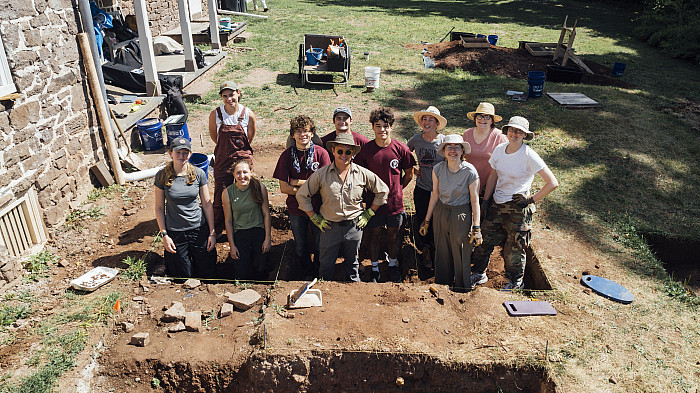History Beneath Our Feet: Untold Stories Discovered at The Speaker’s House
Visiting Instructor of Anthropology Katharine Davis and a group of students have spent the summer working on an archaeological dig project The Speaker’s House located right up the road from Ursinus College in Trappe
History exists all around us. It’s recorded in our books and photos, immortalized on plaques and monuments, can be visualized in art and antiques, and even visited upon some of our greatest landmarks. But the history that exists beneath our feet–the history that remains hidden–may tell a greater story and unlock secrets of the past that remain unseen.
Visiting Instructor of Anthropology Katharine Davis spent the summer leading a group of students on an archaeological dig project at The Speaker’s House located right up the road from Ursinus College in Trappe, Pa. The historic site was home to Fredrick Muhlenberg, the first Speaker of the U.S. House of Representatives and a pivotal figure in the early stages of Montgomery County. The home was the county’s de facto center of government until Norristown became the official county seat.
Starting on June 4 and lasting six weeks, Davis and a group of about a dozen students from Ursinus and other institutions excavated the historical site looking for artifacts that have been lost over time.
The project, in conjunction with the restoration of the property that is set to be done by 2026, has revealed many different artifacts that tell the story of the Speaker’s House and those who lived there.
“As a student of history, how do you tell history when there is no historical record? That’s when you turn to archaeology and anthropology,” said Aidan Mashael ’26, from Edina, Minn..
The students found different types of pottery, utensils, and shoe buckles. Each piece tells a previously untold story from history.
“It may just be a shoe buckle, but it starts to reveal a story about someone who walked a mile in those shoes,” said Mashael. “It’s one thing to read history, but it’s another to see it and discover it with your own eyes.”
Davis’s specialty in the archaeological world focuses on pre-Inkan Andean civilization, primarily the Tiwanaku from Bolivia. Although her experience is working in South America, archaeological work in Pennsylvania has presented new and exciting challenges.
“I’m used to cold weather, no bugs, no rain, and I’ve never had to worry about water getting into units before,” said Davis. “This has been as much of a learning experience for me as it has been for the students.”
The students who have participated in the project have gained real-world practical experience that will help in future careers in archeology and anthropology.
